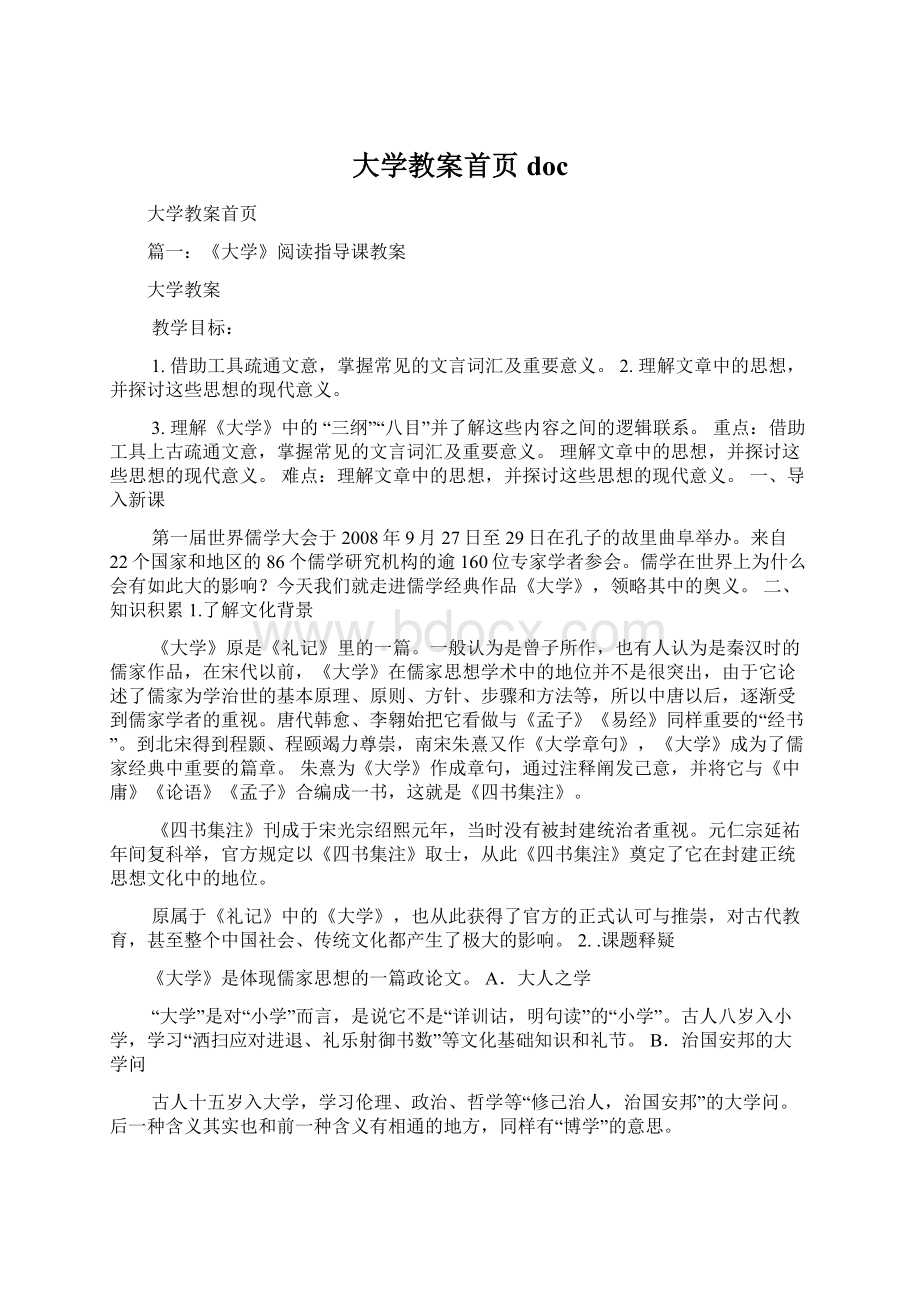大学教案首页doc.docx
《大学教案首页doc.docx》由会员分享,可在线阅读,更多相关《大学教案首页doc.docx(7页珍藏版)》请在冰豆网上搜索。

大学教案首页doc
大学教案首页
篇一:
《大学》阅读指导课教案
大学教案
教学目标:
1.借助工具疏通文意,掌握常见的文言词汇及重要意义。
2.理解文章中的思想,并探讨这些思想的现代意义。
3.理解《大学》中的“三纲”“八目”并了解这些内容之间的逻辑联系。
重点:
借助工具上古疏通文意,掌握常见的文言词汇及重要意义。
理解文章中的思想,并探讨这些思想的现代意义。
难点:
理解文章中的思想,并探讨这些思想的现代意义。
一、导入新课
第一届世界儒学大会于2008年9月27日至29日在孔子的故里曲阜举办。
来自22个国家和地区的86个儒学研究机构的逾160位专家学者参会。
儒学在世界上为什么会有如此大的影响?
今天我们就走进儒学经典作品《大学》,领略其中的奥义。
二、知识积累1.了解文化背景
《大学》原是《礼记》里的一篇。
一般认为是曾子所作,也有人认为是秦汉时的儒家作品,在宋代以前,《大学》在儒家思想学术中的地位并不是很突出,由于它论述了儒家为学治世的基本原理、原则、方针、步骤和方法等,所以中唐以后,逐渐受到儒家学者的重视。
唐代韩愈、李翱始把它看做与《孟子》《易经》同样重要的“经书”。
到北宋得到程颢、程颐竭力尊崇,南宋朱熹又作《大学章句》,《大学》成为了儒家经典中重要的篇章。
朱熹为《大学》作成章句,通过注释阐发己意,并将它与《中庸》《论语》《孟子》合编成一书,这就是《四书集注》。
《四书集注》刊成于宋光宗绍熙元年,当时没有被封建统治者重视。
元仁宗延祐年间复科举,官方规定以《四书集注》取士,从此《四书集注》奠定了它在封建正统思想文化中的地位。
原属于《礼记》中的《大学》,也从此获得了官方的正式认可与推崇,对古代教育,甚至整个中国社会、传统文化都产生了极大的影响。
2..课题释疑
《大学》是体现儒家思想的一篇政论文。
A.大人之学
“大学”是对“小学”而言,是说它不是“详训诂,明句读”的“小学”。
古人八岁入小学,学习“洒扫应对进退、礼乐射御书数”等文化基础知识和礼节。
B.治国安邦的大学问
古人十五岁入大学,学习伦理、政治、哲学等“修己治人,治国安邦”的大学问。
后一种含义其实也和前一种含义有相通的地方,同样有“博学”的意思。
朱熹把《大学》重新编排整理,分为“经”一章,“传”十章。
朱熹认为,“经一章盖孔
子之言,而曾子述之;其传十章,则曾子之意而门人记之也。
”《大学》一文不长,仅有短短的两千余字,但却是先秦、秦汉儒家学说的总括性著作,是儒家人生教育的道德纲领,也是维护封建宗法制度的政治纲领。
《大学》以相当成熟的理论思维构建了一个中国封建社会儒家人生教育的总体框架,构建了一个中国封建社会士人人生发展的宏观图式。
全篇将道德修养和政治议论结合在一起,将人生哲学和政治哲学合而为一,是儒家“入世”思想的全面体现。
2.《大学》采用了很多递进论述的方法
如“知止而后有定,定而后能静,静而后能安,安而后能虑,虑而后能得。
”请将文章中的类似论证整理出来,体会其中的逻辑关系,弄明白它们所说的道理。
古之欲明明德于天下者,先治其国;欲治其国者,先齐其家;欲齐其家者,先修其身;欲修其身者,先正其心;欲正其心者,先诚其意;欲诚其意者,先致其知;致知在格物。
物格而后知至,知至而后意诚,意诚而后心正,心正而后身修,身修而后家齐,家齐而后国治,国治而后天下平。
这个论述,先是由大至小,条目之间是条件关系:
平天下必先治国,治国必先齐家,齐家必先修身,修身必先正心,正心必先诚意,诚意必先致知,致知必先格物。
再由小至大,条目之间是因果关系:
格物而后知致,知致而后意诚,意诚而后心正,心正而后身修,身修而后家齐,家齐而后国治,国治而后天下平。
条目之间脉络清晰,无论是由大至小的条件关系,或者是由小至大的因果关系,剖析深刻,逻辑严密。
3.《大学》的论述可谓“微言大义”,精微的言辞中,蕴含着深刻的道理,这些深刻的道理,对现代人也是很有作用的。
请以“君子有诸己而后求诸人,无诸己而后非诸人”为例
进行分析。
提示:
这句话的意思是:
品德高尚的人自己身上具备了美德,然后再要求别人拥有美德;首先要去掉自己身上的不足,然后再去批评责备他人。
也就是说,要提高别人的道德水平,首先要提高自己的道德水平,要要求别人,首先要要求自己。
它体现了儒家重视注重内向用功、律己甚严的内省的修养方法。
这种方法在现代仍然是有现实意义的,它告诫我们,不能要求别人甚严,而要求自己甚宽。
这对于人与人之间的日常交往,一个部门内部的管理,都有着深刻的启示。
五、小结
本文介绍了儒学文化的主体“三纲”“八目”,两者层次分明、逻辑严密。
文章告诉人们只有通过格物致知,摆脱外在诱惑、困扰,真心诚意地培养高尚的情操,才能够使自己的精神境界得以提高,进而使自己家庭关系符合人伦道德,并最终完成为国建功立业、使天下太平的伟大理想。
篇二:
河北医科大学教案首页
河北医科大学教案首页
教研室:
教师姓名:
授课时间:
篇三:
大学英语教案范本
全新版《大学英语》教案
课程名称:
大学英语(一级)
专业:
本校05普通本科
年级:
2005
学年:
2005-2006
学期:
第一学期
任课教师:
全新版《大学英语》板块任课教师
CourseSchedule
Aims:
1.DevelopingSs’abilityofindependentlearningtobeautomaticlearners.
2.EnhancingSs’abilityinusingEnglish:
improvingSs’fivemicro-skills—listening,
speaking,reading,writing,translation—especiallylisteningandspeakingsothattheycancommunicateinspokenandwrittenEnglish.
Requiredcoursematerials:
1.CollegeEnglish
—IntegratedCurse,ListeningandSpeakingCourse,ReadingCourse
Note:
ReadingCoursebookisusedasSs’self-accessmaterial.
2.OneDictionary:
TeachingandLearning:
1.KeepinmindthatitisYOUwhohavetostudytoimproveyourEnglish.Ifyoudonotstudy
byyourself,thereisnouseincomingtoclass.Inotherwords,justlisteningtotheteacherandotherstudentsinclassdoesnothelpyouimproveyourEnglish.
2.Bewellpreparedwhenyoucometoclass.Itisofgreatimportanceforyoutopreviewthe
coursematerialsbeforeclassaccordingtothecourseschedule.Ifnot,you’llfinditverydifficulttofollowtheclass.
3.Classparticipationisvital.Youshouldactivelyjoininpairworkorgroupdiscussionanddo
oralpresentationbeforeclass.
4.Itisimportanttoturninanyassignmentsbytheduedate.Ifyouknowthatyouhavea
circumstancewhichwillmakesitimpossibleforyoutoturninyourassignmentbytheduedate,youcanandshouldcometoconsultwithmeaboutyourproblembeforehand.
5.Youressaysshouldbedoneinaloose-leafnotebooksoastohandinyourassignmentsbya
loosepaper.
6.Sinceattendance/absenceispartofevaluation,keepinmindthatyourabsencewillreduce
yourevaluation.
UsefulEnglishLearningResources:
Magazines:
EnglishLanguageLearning,CollegeEnglish,EnglishSalon,EnglishWeekly,TheworldofEnglish,EnglishDigest,OverseasEnglish
Newspaper:
21stCentury,ChinaDaily
Websites:
;;;;;.cn;
Unit1WritingForMyself
1.教学目标及基本要求:
Objectives:
Studentswillbeableto:
1)graspthemainideaandstructureofthetext;
2)appreciatethenarrativeskillsdemonstratedinthetext
3)masterthekeylanguagepointsandgrammaticalstructuresinthetext;
4)conductaseriesofreading,listening,speakingandwritingactivitiesrelatedtothethemeoftheunit.
2.教学内容及学时分配:
Timeallotment:
1stperiod:
pre-reading;textorganization
nd2period:
while-reading
3period:
post-readingactivities
4period:
readingpractice
5thperiod:
speaking
6period:
writing
3.教学重点及难点:
Importantlanguagepointsinthetext:
4.教学内容的深化及拓宽:
ththrd
Studentsconductaseriesofreading,listening,speakingandwritingpracticetodeepentheirunderstandingofthepointstaughtinclass.
5.教学方式及在教学中应注意的问题:
Acombinationoftraditionalteachingmethodswiththecommunicativeapproachwillbeadopted.Specialattentionshouldbepaidtoclassroominteraction.Givestudentstimetoadapttothenewteachingmodeintheuniversitythatarequitedifferentfromtheonetheywereusedtointhemiddleschool.Moreencouragementisneededandmoreguidancewillbegiventothemintheirextracurricularstudy.
6.主要参考书目:
季佩英,吴晓真,2001,《全新版大学英语综合教程1-教师用书》。
上海:
上海外语教育出版社。
柯彦玢,张砚秋,2002,《全新版大学英语阅读教程1-教师用书》。
上海:
上海外语教育出版社。
朱万忠,2002,《大学英语阅读进阶1》。
重庆:
重庆大学出版社。
7.思考题和习题:
《全新版大学英语综合教程1》第一单元TextA后的所有习题。
阅读第一单元TextB,完成后面的相关练习。
《全新版大学英语阅读教程1》第一单元及相关练习。
《大学英语阅读进阶》第一单元及相关练习
WritingAssignment
1stPeriod:
Pre-readingTasks:
1)Studentslistentotherecordinganddothepre-readingtaskonpage2oftheirbook.
2)Warm-upQuestions
Studentsarerequiredtoscanthetextandanswerthefollowingquestions:
a)Supposeyouwerethewriter,wouldyouenjoywriting“TheArtofEatingSpaghetti/
noodles”?
Why/Whynot?
b)Whydoestheauthorenjoywritingthis?
Inwhichparagraphliestheanswer?
c)Lookatthetitleandfindoutinwhichparagraphasimilarphraseappears.Readthis
paragraphandexplaininyourownwordswhattheauthormeansbysaying“writeformyself.”
3)Mainideaandtextorganization
Pleasegothroughthewholetextwithin3minutesandcircleallthetimewords,phrasesandclauses,andthenanswerthefollowingquestions:
a)Fromwhichpointondoestheauthorstarttalkingabouthisnewexperience?
b)Wheredoeshestopwritingaboutthisnewexperience?
DoTextOrganizationExerciseonP.9.
4)Textanalysis
Selectionofdetails:
theauthorisverygoodatselectingdetailstoprovehispoint.Buthow?
Pleasethinkaboutthefollowingquestions.
a)Whatdetailsareselectedtoshow“I’dbeenboredwitheverythingassociatedwithEnglish
courses”?
b)WhatdetailsaregiventoshowthatMr.Fleaglewasdullandrigid?
c)Bywhichsentencesdoestheauthormanagetogiveustheimpressionthathisessaywas
verygood?
2ndPeriod
1)TextAnalysis
Repetition:
Pleasethinkaboutthefollowingquestions:
a)Howmany“prim”or“primly”doestheauthoruseinpara.2?
b)Howmany“Iwanted”arethereinpara.5?
c)What’stheuseofrepetition?
Synonymouswordsphrases:
Theauthorisalsoverygoodatavoidingrepetitionbyemployingsynonymouswordsandphrases.Pleaselookforsynonymsofthefollowingwordsandphrases.
1)tedious2)write3)anticipate4)prim5)recall
6)recapture7)delight8)contempt9)topic
2)Languagepoints
Theteacherexplainsthefollowinglanguagepointstothestudents:
Offandon;takehold;bore;turnout;bore;anticipate;rigid;severe;tackle;faceupto;scan;recall;violate;holdback;avoid;career;inspire;associate.
3rdPeriod
Post-readingTasks
1)Studentsarerequiredtodiscussthefollowingquestionsinpairs:
AccordingtoMr.Fleagle,whatistheveryessenceoftheessay?
Whattenseshouldyouusetodescribeamemorableincident?
2)Translation:
TheteacherguidesthestudentsthroughthetranslationoftheusefulexpressionsintheCDROM.
3)Dictation:
StudetnsdothespotdictationtaskintheCD-ROM.
4PeriodReadingPractice:
1)UncleJim’sWinkatLife
Groupdiscussion:
Whatisathesis?
PairWork:
Studentsdiscussthefollowingquestionsinpairs:
a)Theauthorbeginsthisstorywithachildhoodexperience.WhenUncleJimknewabouthis
lie,whatdidhesay?
b)WhatdidtheboydowhenhefoundMrs.Jameson’sgloves?
c)Whatdidhegetforhishonestyinreturningtheglovestotherightowner?
d)WhatdidUncleJimtellabouthisbaldhead?
e)HowdidUncleJimtreathisfriends?
f)
thWhatlessondidtheboylearnfromthebet?